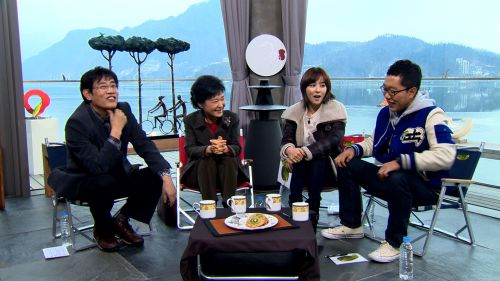GNP leader and presidential hopeful reveals private side on first TV talk show appearance
Rep. Park Geun-hye, the Grand National Party’s chief and strongest presidential candidate, sang and made jokes with comedians on a TV show late Monday, attempting to change her long-time reputation for seriousness.
Her first TV talk show appearance came as she pushes to remake the sinking ruling party ahead of the April 11 general elections. Polls released earlier in the day showed that her liberal rivals were gaining ground, riding on a strong anti-incumbent mood among voters, particularly those in their 20s to 40s.
Park, too, trailed her potential presidential rival, Ahn Cheol-soo, in news media polls.
Apparently mindful of the challenges ahead, Rep. Park attempted to highlight her sincerity in efforts to change old politics and better communicate with the people.
“This is an era when one’s sincerity and communication skills are important. So I thought this could be a good opportunity to talk in a comfortable setting,” she said on the SBS talk show Healing Camp, explaining why she decided to participate in it.

Park Geun-hye, leader of the Grand National Party, appearing on an SBS talk show aired Monday night. (SBS)
Park, though she leads a large faction within the GNP, has often been criticized for weak leadership, stubbornness and a lack of openness toward her colleague lawmakers. She has also come under fire for speaking as little as possible in public about controversial issues.
On the show, however, she engaged in lively conversations with three hosts of the show, including Kim Jae-dong, a comedian known for his liberal political views and criticism of conservative President Lee Myung-bak and the GNP.
She described Ahn as a professor popular among young people and said he was good at connecting with the younger generation.
The GNP leader has recently made a series of efforts to win the hearts of young voters. She appointed Lee Jun-seok, a 26-year-old CEO of a venture firm, as a member of her leadership council, and Pyo Chul-min, another 26-year-old venture firm CEO, as an advisor.
On the show, Park also shared some of her personal life and the pains she went through after her parents -― former President Park Chung-hee and first lady Yook Young-soo ― were shot to death.
As the eldest daughter of the military strongman who ruled the country for 18 years, she grew up in Cheong Wa Dae. She played the role of first lady for about five years after her mother was killed by a bullet meant for her father.
“Busy bees don’t have time to grieve. I remember writing this in my diary at that time,” she said. “I had dreams similar to what others of my age (22) typically had at that time. But I had to give them all up completely (to act as the first lady).”
Her service as first lady ended abruptly when her father was assassinated by his intelligence chief in 1979.
She said she went through severe pain and stress that actually made her limbs bruised as if beaten.
“I dreamt if only I were born to just an ordinary family...” she said.
After the death of her father, she lived for 17 years as a near-recluse.
“I lived as an ordinary citizen, out of the media spotlight,” she said.
Then when the Asian financial crisis hit the nation in 1997, she said, she felt that she must do something for the nation which her father developed, and she decided to enter politics.
“I live for only one goal ― the dream that I had when I decided to enter politics or the faith that I will devote my everything to the people.”
Her family background is both her strength and weakness.
Park enjoys popularity thanks to her serene image that comes from public nostalgia for the Park Chung-hee era in which the country made a miraculous rise from the ruins of the Korean War. To her opponents, however, that is the key reason why she should not be made president.
Near the end of the one-hour TV show, she was asked what she thought of her father’s 18-year rule of the country.
“There are conflicting views now (about my father). It is really something the history and the people will judge,” Park said.
She has never apologized for the faults of her father and to those who were brutally tortured, imprisoned or even killed under his dictatorship.
By Lee Sun-young (milaya@heraldcorp.com)






